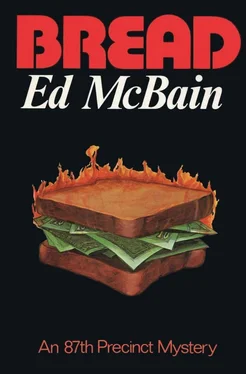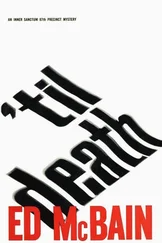“I remember.”
“Okay. So if, first, I can help establish your innocence with the insurance people, and, second, get a lead onto the homicide, I’ll go home happy. What do you say, Mr. Grimm? You want to send me home happy, or you want my wife and kids to eat with a grouch tonight?”
“My books and my correspondence are my business,” Grimm said, “not the Police Department’s.”
“When Parker gets back from vacation, he’ll probably want to look at them, anyway. And he can get a warrant, if he has to.”
“Then tell him to get one. Or go get one yourself.”
“I’ve already got one,” Carella said, and handed it to him.
Grimm read it in silence. He looked up and said, “So what was the song and dance?”
“We try to be friendly, Mr. Grimm,” Carella said. “You want to unlock your file cabinets, please?”
If Grimm had anything to hide, it was not immediately apparent to Carella. According to his records, he had started the import business in January, eight months ago, with a capital investment of $150,000...
“Mr. Grimm,” Carella said, looking up from the ledger, “the last time we talked, you told me you’d come into some money last year. Would that be the hundred and fifty thousand you used to start this business?”
“That’s right,” Grimm said.
“How’d you happen to come into it?”
“My uncle died and left it to me. You can check if you like. His name was Ralph Grimm, and the will was settled last year, in September.”
“I’ll take your word for it,” Carella said, and went back to the ledger. He had no intention of taking Grimm’s word for anything.
The first business transaction listed in Grimm’s books was for the initial purchase of a hundred thousand little wooden beasties back in January. There was a sheaf of related correspondence starting in December, in which Grimm haggled back and forth over the price with a man named Otto Gülzow of Gülzow Aussenhandel Gesellschaft in Hamburg. There was also a customs receipt indicating that Grimm had paid an 8-percent duty at the port of entry. There were three separate canceled checks: one for 37,120 marks paid to the order of Gülzow Aussenhandel and totaling approximately 10 percent of the agreed-upon purchase price (presumably to cover Gülzow for the risk of packing and shipping); another for 9,280 American dollars paid to the order of the Bureau of Customs; and the last, a certified check for 334,080 marks, paid to the order of Gülzow, and dated January 18, presumably the date the shipment had been handed over to Grimm. The three checks totaled close to $125,000, the price Grimm had said he’d paid for the first shipment. Everything seemed in order. An honest businessman doing business, legally shipping in his little wooden creatures, paying the import duty, and then selling them to retail outlets all over the United States.
According to Grimm’s records, the wooden menagerie had indeed caught on like crazy. His files substantiated that there had been orders for the entire first shipment, and payments to his firm (which incidentally was called Grimports, Inc., Carella realized with a wince) totaling $248,873.94, somewhat less than the $250,000 Grimm had estimated but close enough to establish his veracity. There followed another batch of correspondence with Herr Gülzow, during which Grimm argued for a lower price on the next shipment, since he was ordering twice as many little wooden dogs, cats, turtles, rabbits, horses, etc. Gülzow argued back in Teutonically stiff English that no discount was possible, since he himself purchased the carvings at exorbitant prices from peasants who whittled them in cottages here and there throughout the Fatherland. They finally compromised on a price somewhat higher than what Grimm had desired. Again, there was a canceled check for 10 percent of the purchase price, a check to the Bureau of Customs, and a certified check to Gülzow Aussenhandel. Again the total came near to the $250,000 Grimm had stated to be the cost of the second shipment from Germany. This had been the shipment lost in the warehouse fire.
In corroboration of Grimm’s earlier statement, there were orders from retail stores all over the country for the entire stock on hand, and there was return correspondence from Grimm promising delivery on or about August 12. There was also a new batch of correspondence with Gülzow, ordering another 400,000 of the animals, at a further slightly reduced price, and several letters from Grimm instructing that the shipment should be delivered first to a packing firm in Bremerhaven, since a portion of the previous shipment had arrived partially damaged and he wished to make certain this did not happen again. (Grimm was quick to assure Gülzow that he was in no way holding Gülzow Aussenhandel responsible for the damage en route, but that since precautionary packing measures would be costing him 6,000 marks, could not Gülzow adjust the price on the new shipment to take into account this additional expense? Gülzow promptly replied that his firm “packed quite well the animals,” and that any additional packing Grimm felt necessary would have to be undertaken at his own expense. It was agreed that the animals would be sent to Bachmann Speditionsfirma, a packing house in Bremerhaven, on or about July 15, and that Bachmann would in turn ship them to the United States. Gülzow asked for the customary 10-percent check before sending the goods to Bachmann. There was a canceled check in the files, indicating that Grimm had complied with the request on July 9.
There was also a sheaf of correspondence with Erhard Bachmann, the Bremerhaven packer, chronologically overlapping the letters to and from Gülzow. The first letter in the Bachmann file outlined the method of packing he proposed to use; the carvings would first be individually wrapped in straw-filled brown paper, and then packed in wooden crates stuffed with excelsior. A condition of the contract with Bachmann (dated July 3) was that he would be held financially responsible for any portion of the shipment that arrived in anything less than perfect condition. Grimm’s letter in reply agreed to the method of packing. The next letter from Bachmann advised Grimm that he had received the 400,000 animals from Hamburg on July 17, and was proceeding to pack them as per instructions. The last letter was dated July 26, and advised Grimm that the animals had been packed and would be shipped aboard the cargo vessel Lottchen leaving Bremerhaven on August 21 and arriving in America on August 28. It further mentioned that Bachmann had been advised through Gülzow that a certified check in the amount of 1,336,320 marks was expected to be turned over to his company representative at the port of entry before delivery of the cargo was made. There was only one puzzling paragraph in Bachmann’s letter. The paragraph said:
We have today received your payment for packing as per our contract of July 3, for which thank you. Please be assured the cargo will reach you in excellent order.
Carella searched through the canceled checks again. He could find no check made out to Bachmann Speditionsfirma. He glanced up at Grimm, who was sitting at his desk and watching Carella in silence.
“This payment Bachmann mentions,” Carella said. “When was it made?”
“Sometime at the end of last month,” Grimm said.
“I don’t see a canceled check for it.”
“It sometimes takes time for checks to clear,” Grimm said. “Payment was made in marks. Where foreign exchange is involved...”
“Well, this is the sixteenth of August,” Carella said. “It should have cleared by now, don’t you think?”
“It should have, but it hasn’t. I’m not in charge of international banking,” Grimm said with some irritation.
“Mind if I see the stub for the check you wrote?” Carella asked.
Читать дальше









